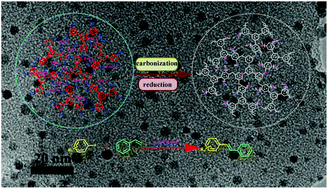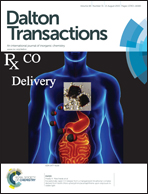Controlled synthesis of uniform palladium nanoparticles on novel micro-porous carbon as a recyclable heterogeneous catalyst for the Heck reaction†
Abstract
Novel dual-porous carbon-supported palladium nanoparticle (Pd NP) catalysts were prepared by sequential carbonization and reduction of microporous organic polymer-encaged PdCl2. The diverse pore structure of microporous organic polymers provides a reservoir for the palladium precursors and prevents Pd NPs from sintering during the carbonization and reaction. The microporous structure has a significant effect on the size and dispersion of palladium NPs. The average size of the Pd NPs (in the range of 4–6 nm) was tuned by changing the pore size distribution and the carbonization temperature. The resulting carbon-supported Pd NPs were characterized by TEM, BET, XRD, and XPS and the Pd loading was calculated by AAS. The encaged Pd NP catalysts prepared by this methodology exhibited outstanding stability and reusability in the Heck reaction and could be reused at least 10 times without appreciable loss of activity.


 Please wait while we load your content...
Please wait while we load your content...